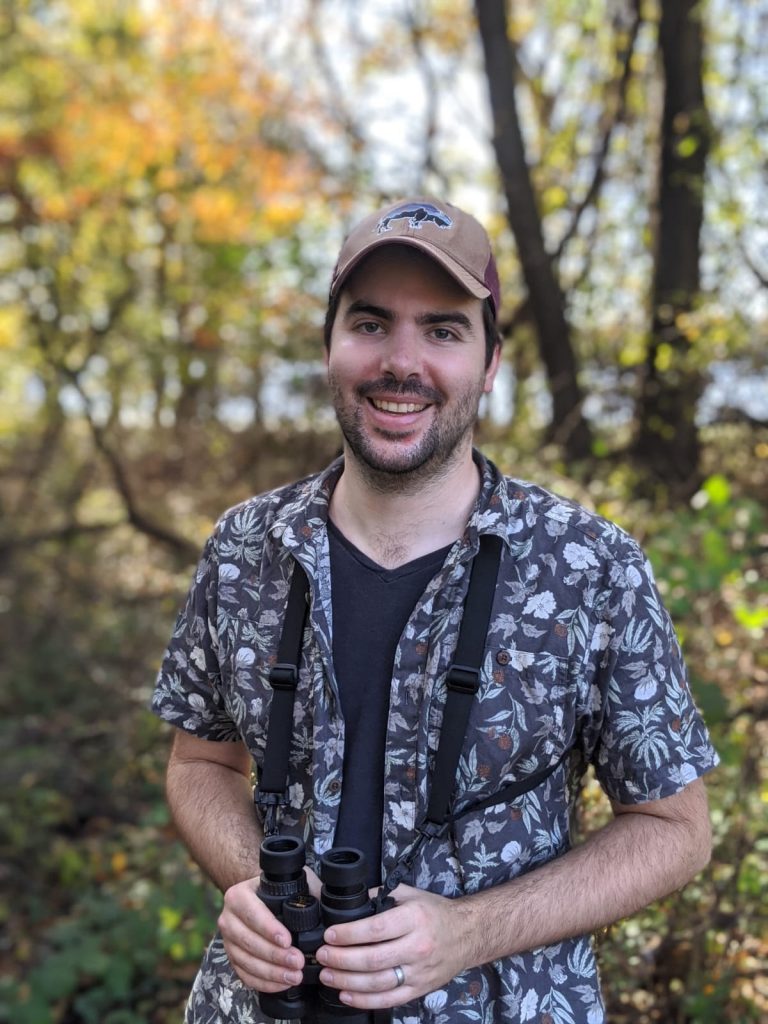Meet our Birds, Bees, & Trees #EcoChampion
We welcomed Timothy Swartz, a current PhD student in the Integrative Ecology Lab at Temple University, to discuss the benefits of birds in urban environments. Timothy is an ecologist, conducting research on patterns of biodiversity and their relationship to the distribution and quality of habitat. He is particularly interested in studying the ecology of organisms in human-altered environments like urban landscapes.
Where it all started.

Swartz started his academic career at Messiah College where he earned a BS in biology and the conservation of amphibian communities in vernal pools. In 2018, he earned a MS in Natural Resources and Environmental Sciences from the University of Illinois at Urbana-Champaign and worked in the Ecology and Conservation Biology Lab. Now he is a PhD student with Dr. Jocelyn Behm in the Integrative Ecology Lab at Temple University.
Life in the field.
As a field biologist, Timothy’s recent research investigates the role of birds in providing benefits to urban residents. Without being asked, birds fill our neighborhoods with song, hunt down pesky insects in our vegetable gardens, and gobble up littered food from our sidewalks. Timothy’s goal has been to investigate how people can return the favor by ensuring that our urban green spaces have the trees and other plants birds need to thrive. His findings could help fuel solutions to the growing problems of litter, tree canopy loss, and the widening gap between people and nature in Philly neighborhoods.
Here are some of our favorite facts from Timothy’s research, highlighted in our Stories of Sustainability webinar.
Positive impacts of birds in city landscapes.
With over 100 urban bird species in the city of Philadelphia and beyond, there are countless benefits that humans derive from nature. In Timothy’s research, he found that cities provide novel resources to people and ecosystems, including birds.
Species provide ecosystem services, which are services that include acoustic enrichment, pest control, seed dispersal, and visual enrichment. Birds provide songs to the spaces that people enjoy, control pests for our gardens and outdoor spaces, scatter seeds to help our urban areas, and add pops of color that are aesthetically pleasing. These factors all make birds vital to urban sustainability.
Timothy defines urban sustainability as finding the balance between habitat for animals and plants and the health and wellbeing of people…
“Creating cities where all people and nature can thrive”
Linking birds between habitat and ecosystem services.
By using these traits to link birds to ecosystem services, Timothy found that Philadelphia supports a diverse array of birds. Acoustic enrichment is supported by birds’ song syllables and the pleasure that strong and complex songs bring to humans. Birds with a majority diet of insects provide great pest control for our urban crops. Similarly, birds that eat a lot of fruits play a large role in seed dispersal. Birds with warm tones, like yellow, red, and orange, trigger a psychological response of enjoyment.
Differences in habitat influence which birds are present and what ecosystem services they provide. Philadelphia itself has a variety of urban green spaces. Varying from big open parks, overgrown and populated trails, and vacant lots. Timothy concluded in his research that the most important factor in these urban green spaces was local tree cover.
Timothy then led his research asking, how much of the park is covered by trees?
Areas with higher canopy cover had birds with a higher average syllable count, visual enrichment, pest control, yet a weak pattern for seed dispersal. Landscape tree cover saw even larger effects, especially with song complexity and a much greater increase in pest control and seed dispersal.
Trees, wealth, and ecosystem services go hand-in-hand.
His research found that trees are really important to both green spaces and across the urban landscapes. Not only do they provide cooler areas in cities, but they also provide habitat for organisms that provide ecosystem services like birds.
Thinking in the context of urban canopy tree cover, areas of low wealth have far fewer trees and less canopy cover. Therefore, communities that suffer from racial injustice and redlining have lost more than what they have. Timothy found that there were higher enrichments, pest control, and seed dispersion, bringing much more positive effects to wealthier neighborhoods.
To build sustainable cities, we must think about them as integrated social-ecological systems.

